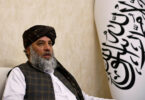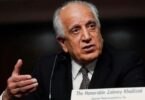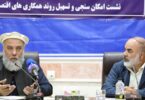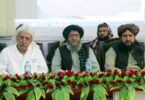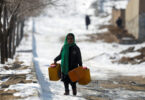KABUL (Tolo News): Abdullah Abdullah, the head of the High Council of National Reconciliation (HCNR), said the system will collapse if Afghan leaders do not forge a consensus on the issues of national importance.
Speaking at the 10th assassination anniversary of Gen. Daud Daud, the former commander of 303 Pamir corps in Kabul, Abdullah called on Afghan political leaders to put aside their political differences and work for the peace process. Mohammad Younus Qanooni, the former vice president of Afghanistan at the same event warned that Afghanistan would slip into a new crisis if government leaders do not come up with the necessary reforms in the government to save the gains the nation has made in the past two decades.
“There are serious differences,” said Abdullah, referring to the differences between Afghan political leaders. “There is a need to find systemic solutions for the questions that come from the public—so, ultimately, with the support of the people this ship (political system) is saved from a possible collapse,” said Abdullah. “If our government leaders do not endorse reforms and do not accept the ground realities of the Afghan society or do not accept the demands of the Afghan people and continue the work without a national policy, then there is the possibility for a collapse in Afghanistan,” said Qanooni.
The statements come as the Afghan government has so far failed to form the much-anticipated State Supreme Council, in which influential Afghan political leaders are expected to serve as members. Political leaders have said that members of the council have strong disagreements with President Ashraf Ghani on the authority of the council.
“The crisis of distrust that arises from within the system is the factor that will lead the government to collapse–before the system collapses from any external factors,” said Qanooni. “Before we address our issues with the Taliban, we need to address the issues on those fronts where we are already fighting–on our own Republic side, where we chant the slogan of the Republic,” said Assadullah Saadati, the deputy head of High Council of National Reconciliation.
“The Supreme State Council is the demand of all people,” said Nazir Ahmadzai, adviser to President Ashraf Ghani. “A gentleman has sat in the Arg (Presidential Palace) and portrayed his friends as national personalities—sometimes he brings Fazli and sometimes Mohib—it is good that they are your friends–congratulations to you!–because they are your aides. But on what basis can you ask them to sit down with Ustad Sayyaf?” said Abdul Hafiz Mansour, a member of the peace negotiating team representing the Islamic Republic of Afghanistan in the talks with the Taliban.
Politicians believe that the withdrawal of US forces from Afghanistan, and also the political division between leaders, has emboldened the Taliban in its hopes to take power by military means. Supporters of the republic system and former Afghan mujahideen leaders have said that they will not allow the Taliban to take over power militarily.

